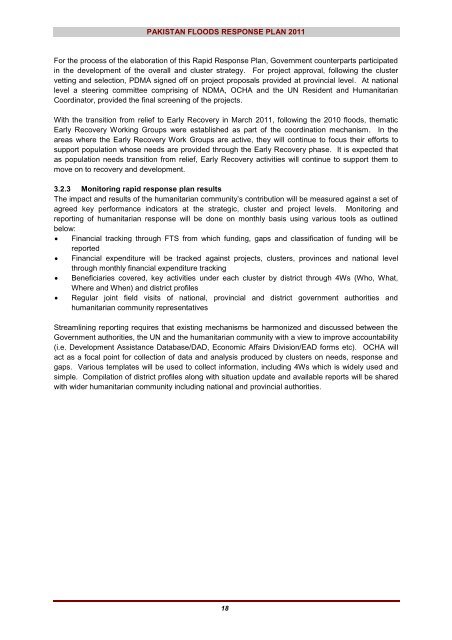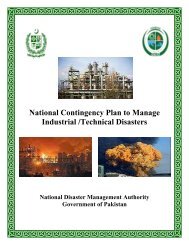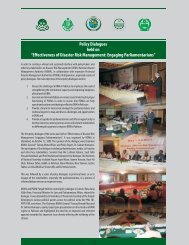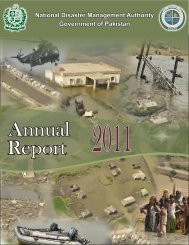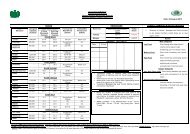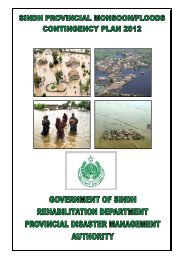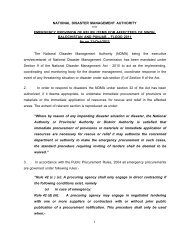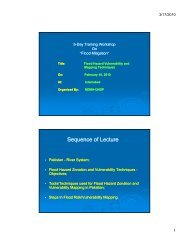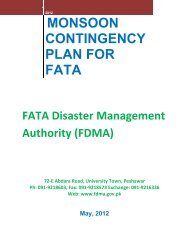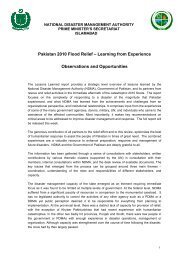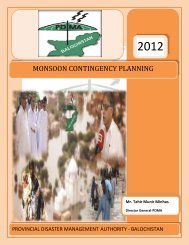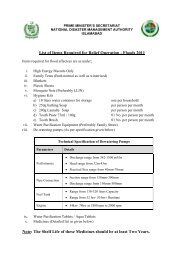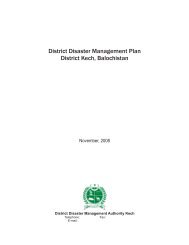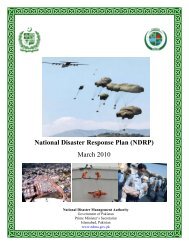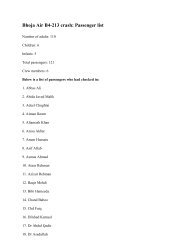PAKISTAN FLOODS RESPONSE PLAN <strong>2011</strong>age and location. Attention to cross-cutting issues (Protection, Early Recovery, Nutrition, DRR,Environment and Gender) where applicable, is recommended.In consultation with the relevant <strong>Pakistan</strong>i authorities, the HCT has agreed the following strategicobjectives for the Rapid <strong>Response</strong> Plan:1. Provide humanitarian and protection assistance in a timely and equitable fashion to groupsprioritized as most vulnerable who have been affected by the floods.2. Ensure the preservation of existing early recovery programmes, while ensuring timely earlyrecovery activities are commenced. Plan for a timely transition back to early recovery, to enablethe continuum to recovery and development.3. Utilize opportunities to create a wider, more effective humanitarian response in <strong>Pakistan</strong>. Strengthen and develop existing humanitarian coordination structures in provinces anddistricts Support capacity to deliver responsible humanitarian action through <strong>Pakistan</strong>i central andlocal authorities, NGOs and civil society, in order to reduce aid dependence Generate disaggregated, local evidence for humanitarian strategy through data collection,analysis, monitoring and evaluation mechanisms3.2.1 Project selection and prioritization methodologyPriority needs and sectors have been identified through a review of available assessment data andresponse capacities and consultations within the humanitarian community. Each cluster‟s responsestrategy has been developed to recognize that the Government of <strong>Pakistan</strong> (through its NDMA andPDMA) will lead the relief and recovery activities in flood-affected areas, and that the humanitariancommunity will focus on covering gaps where the needs exceed the government‟s response capacity.Project selection criteria Projects are in line with relevant cluster objectives & overall strategic priorities, including thegender marker. All project activities must remedy, mitigate or avert direct threats to affected people within a shorttime span (not more than six months). Proposing organization with planned partners must have a recognized capacity, includingpresence in selected affected areas to implement the project, & ensure planned activities arerealistic, relevant, appropriate, and that impact can be monitored. Projects must be evidence-based, taking into consideration vulnerability or possiblediscrimination, justification for proposed projects should be provided. Projects must be planned in accordance with geographic prioritization (notified districts in Sindhand Balochistan).Critical to ensure actions Strengthen and develop existing humanitarian coordination structures in provinces and districts Support capacity to deliver responsible humanitarian action through <strong>Pakistan</strong>i central and localauthorities, NGOs and civil society, to reduce aid dependence Generate disaggregated, local evidence for humanitarian strategy through data collection,analysis, monitoring and evaluation mechanisms3.2.2 Coordination arrangementsAt national level, the inter-cluster coordination meeting is co-chaired by NDMA and OCHA; while atprovincial level, PDMA co-chairs with OCHA. Cluster coordination is carried out by the nominatedInter-Agency Standing Committee (IASC) member and NDMA or their delegate at national level; andwith PDMA or delegate at provincial level. District level coordination is directed by the DistrictCoordination Officer (DCO). The District Disaster Management Authority (DDMA) co-chairs interclustercoordination with the UN representative.17
PAKISTAN FLOODS RESPONSE PLAN <strong>2011</strong>For the process of the elaboration of this Rapid <strong>Response</strong> Plan, Government counterparts participatedin the development of the overall and cluster strategy. For project approval, following the clustervetting and selection, PDMA signed off on project proposals provided at provincial level. At nationallevel a steering committee comprising of NDMA, OCHA and the UN Resident and <strong>Humanitarian</strong>Coordinator, provided the final screening of the projects.With the transition from relief to Early Recovery in March <strong>2011</strong>, following the 2010 floods, thematicEarly Recovery Working Groups were established as part of the coordination mechanism. In theareas where the Early Recovery Work Groups are active, they will continue to focus their efforts tosupport population whose needs are provided through the Early Recovery phase. It is expected thatas population needs transition from relief, Early Recovery activities will continue to support them tomove on to recovery and development.3.2.3 Monitoring rapid response plan resultsThe impact and results of the humanitarian community‟s contribution will be measured against a set ofagreed key performance indicators at the strategic, cluster and project levels. Monitoring andreporting of humanitarian response will be done on monthly basis using various tools as outlinedbelow: Financial tracking through FTS from which funding, gaps and classification of funding will bereported Financial expenditure will be tracked against projects, clusters, provinces and national levelthrough monthly financial expenditure tracking Beneficiaries covered, key activities under each cluster by district through 4Ws (Who, What,Where and When) and district profiles Regular joint field visits of national, provincial and district government authorities andhumanitarian community representativesStreamlining reporting requires that existing mechanisms be harmonized and discussed between theGovernment authorities, the UN and the humanitarian community with a view to improve accountability(i.e. Development Assistance Database/DAD, Economic Affairs Division/EAD forms etc). OCHA willact as a focal point for collection of data and analysis produced by clusters on needs, response andgaps. Various templates will be used to collect information, including 4Ws which is widely used andsimple. Compilation of district profiles along with situation update and available reports will be sharedwith wider humanitarian community including national and provincial authorities.18


